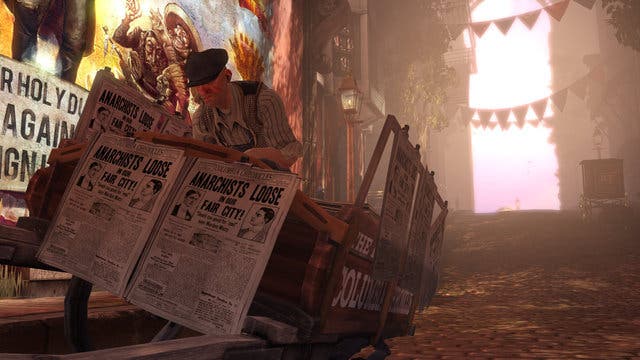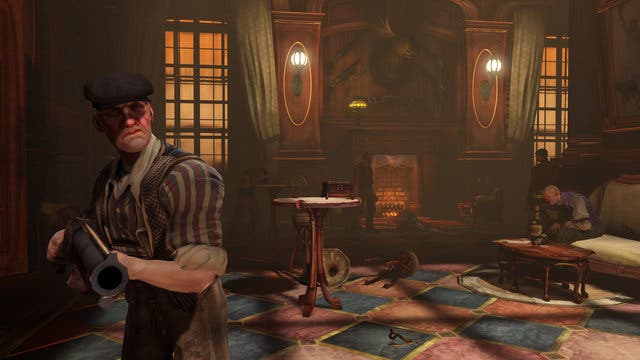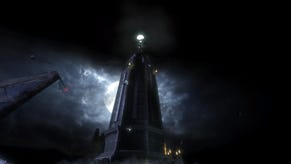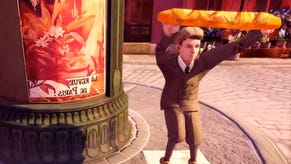BioShock Infinite
Frontierland.
It's easy to peg DeWitt as a pragmatic badass and Elizabeth as a childish goof until their happy looting spree is interrupted by the appearance of the songbird, a giant mechanical fowl. We're told this has been Elizabeth's only friend over the past dozen or so years, as well as her jailer. Its only goal is to bring her back to the tower, and it will stop at nothing to "rescue" her.
The damsel in distress premise soon takes a dark turn. "Promise me, if it comes to it, you won't let him take me back," says Elizabeth as she places your hands around her neck. It's a chilling moment, its power amplified through some fantastic animation and voice acting told through faces that are cartoonish and expressive.
"I think he [DeWitt] is a bit cynical," Levine later says. "That's the point in the relationship where the tenor changes a little bit. His respect for her goes up a little bit, but he doesn't know how to deal with her... Cynicism is about thinking you can't be surprised, and Elizabeth surprises him."
The revelations don't end there. Shortly thereafter, Elizabeth tries using her powers to heal a dying horse. "It's just a horse," DeWitt grumbles before pulling out a pistol. A prompt to euthanize pops up, requiring the player to hold it down for a set period of time. Just as he's about to take the shot Elizabeth yells, "No!" and the prompt crumbles.
Pressing up against the horse, a luminous radius emanates from her touch, bathing everything within it in a clean and bright light. At first she doesn't succeed but she tries again until, on her third attempt, we're suddenly transported to a grimy city street, complete with a paved road and seedy neon signs.
It's a jarring moment, and one that proves that BioShock Infinite's Elizabeth is more than just another addition to the long line of needy sidekicks such as Resident Evil 4's Ashley, Ico's Yorda and Enslaved's Trip. She's a quite beguiling enigma in herself.

Before there's time to gather a sense of place a siren sounds and an ambulance enters this new reality, and it's set on a swift collision course with Elizabeth. The moment it's about to hit her, the reality crumbles and Columbia whooshes back in to view. The horse didn't make it.
"I can't control it," she sobs. "It's not possible."
"After what just happened, you really want to take bets on what's possible?" DeWitt replies.
Next the pair enter Vox Populi territory. Alleys are draped in red flags, large projections spout propaganda, and a corpse lies in the street with "hoarder" smeared in blood beside it. Meanwhile the Vox Populi are throwing Molotov cocktails, looting civilians, and making catcalls at Elizabeth. Hostile though the territory may be, we're not being directly attacked.
This is one of the most notable new ideas in BioShock Infinite. Not all NPCs are threats. Some won't fight unless provoked, and though not apparent in the demo, Levine claims that people can fight alongside you if you have a common foe.

"You don't know what's going to set people off," he comments. You'll have to stop and think before you shoot. You're aiding a fugitive, but not everyone knows what you look like. If you see a group of people up ahead do you get the drop on them and open fire, or try to keep a low profile and hope it doesn't come to blows?
We can only keep quiet for so long, before our cover is blown. The Vox Populi are about to publicly execute a man while a bloodthirsty crowd cheers on. A prompt appears giving the option to intervene. We take it. "He's just a postman," DeWitt shouts before the crowd turns its attention towards us. "It's DeWitt!" a man yells before the mob opens fire.
Things get dicey for a moment with the player getting riddled with bullets every which way, and serving as a reminder that BioShock's shooting mechanics were never its forte. With no cover system or sprinting on display, it looks a little rough still.








